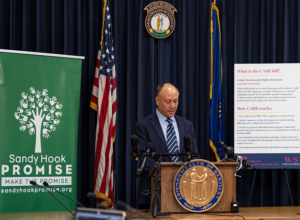You may have heard that “background checks” are one way to prevent gun violence. You might also be wondering, “Don’t gun sales already involve background checks?”
The answer is, yes. But also, no. Unfortunately, federal law does not require a background check on all gun sales.
In this blog post, you’ll learn about on one dangerous flaw in the background checks system: the stranger-to-stranger loophole. Along the way, we’ll also answer the question we should all be asking: “Why are background checks an important part of reducing gun violence in our country and what needs to change?”
Background Checks Save Lives
Completing a background check during a gun sale is critical to reducing gun violence. They help ensure guns aren’t sold to people who shouldn’t have them. For example, a completed background check can identify a convicted felon or domestic abuser. Identifying prohibited people before they complete a purchase reduces the chance a firearm will be used to harm others.
Since 1994, more than 3 million illegal gun sales have been stopped by a standard background check.1 Plainly put, completed background checks can help save lives.
Not Every Gun Sale Goes Through a Background Check
The federal background check system works. However, it only applies to certain types of gun sales. Only guns sold by a federally licensed firearms dealer must include a background check. But many people sell guns through “private sales” and these sales don’t require background checks.
This means there is a “loophole” in federal law. This loophole makes it legal to sell guns without ever conducting a background check on the buyer. “Private sellers” use this loophole regularly.
Private sellers can include online merchants, like Armslist.com. These online merchants can sell a lot of guns every day. Private sellers can also be your neighbor or colleague who want to sell you – or an absolute stranger – part of their personal collection. Based on federal law alone, neither of these examples would require a background check.
Private Sales and the Stranger-to-Stranger Loophole
This loophole in private sales has a loophole of its own. We call it the “stranger-to-stranger loophole.” This loophole refers to a very specific type of private gun sale: a private sale between two people who did not know each other before the sale (AKA “strangers”).
Online sales and gun shows are two places where private sales often occur between strangers. However, because of the loophole, none of these sales require a background check. In other words, the stranger-to-stranger loophole allows a private seller to sell a gun to an absolute stranger without ever conducting a background check on the buyer.
Because background checks aren’t required, stranger-to-stranger gun sales are an easy – and safe – way for prohibited people to buy guns. This loophole puts everyone at risk.
Closing the Stranger-to-Stranger Loophole Can Save Lives
Guns sold by private sellers aren’t subject to a background check. This means there’s no way to confirm if a potential buyer is prohibited from having a firearm. In the worst-case scenario, this means a person could be rightly denied a gun by a licensed dealer, but still buy one in a private sale. This is exactly what happened in the 2019 mass shooting in Midland-Odessa, Texas. The shooter failed a background check through a licensed firearms dealer but was able to buy a gun through a private seller in Lubbock. He went on to kill seven and wound 25 people.
States can pass laws closing the stranger-to-stranger loophole. If states do this, they will add a much-needed layer of protection. Background checks work, which is why they should be used every time a gun is sold between two people who don’t already know each other.
The Bottom Line
The stranger-to-stranger loophole is dangerous and puts communities at risk. Closing the loophole through state law is the right path forward – it doesn’t end private sales. It supports responsible gun sales and increases public safety in the process.


